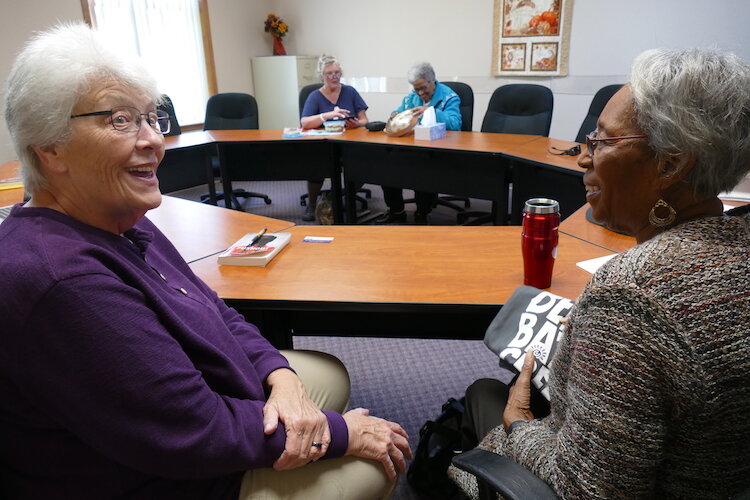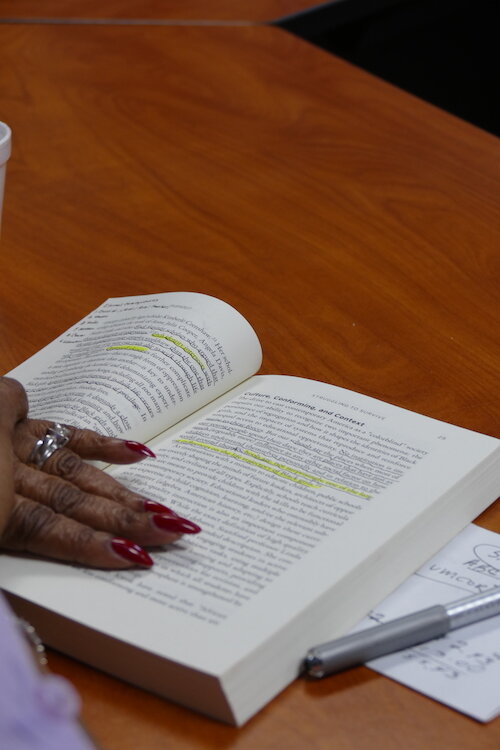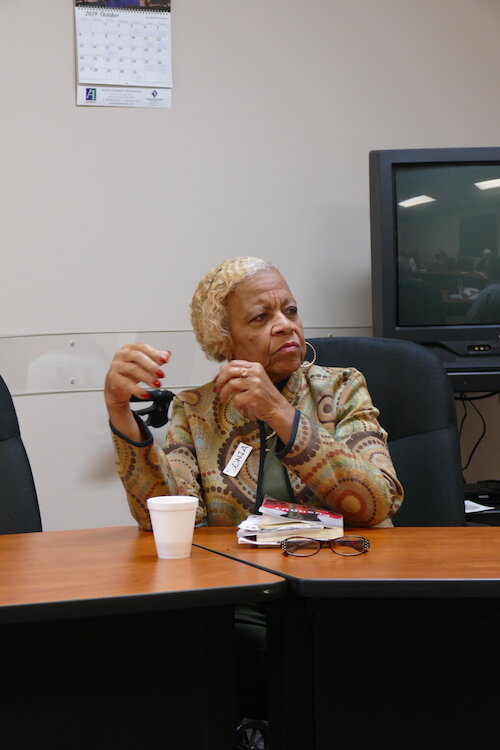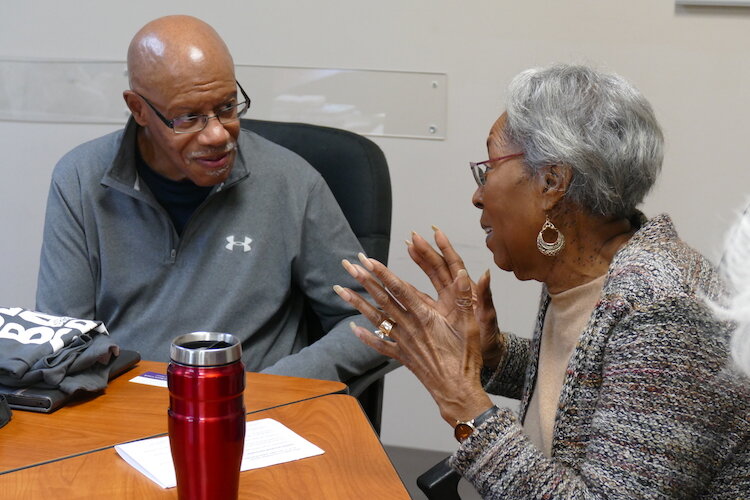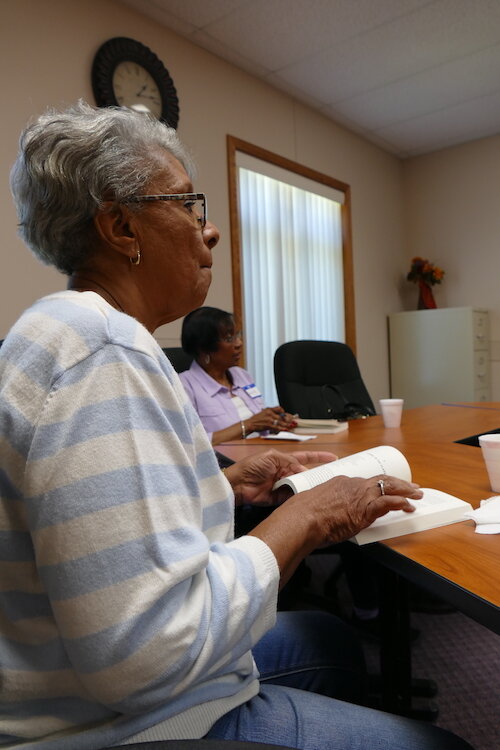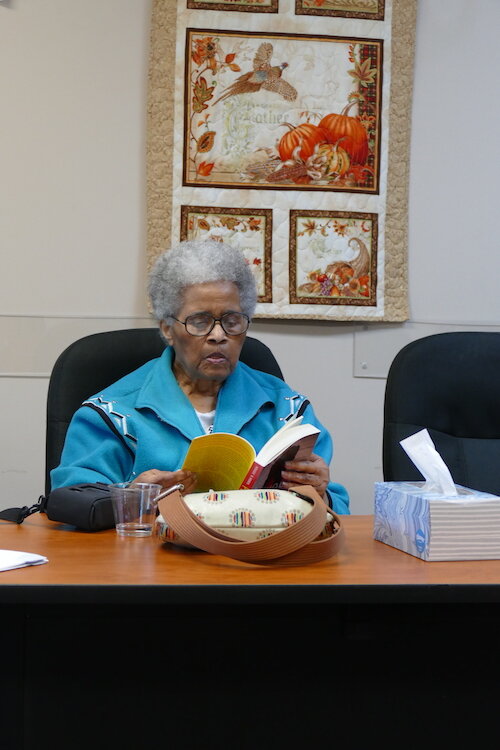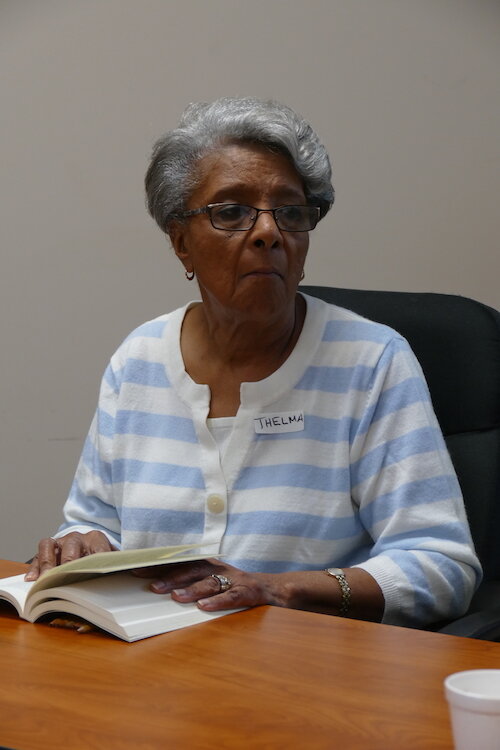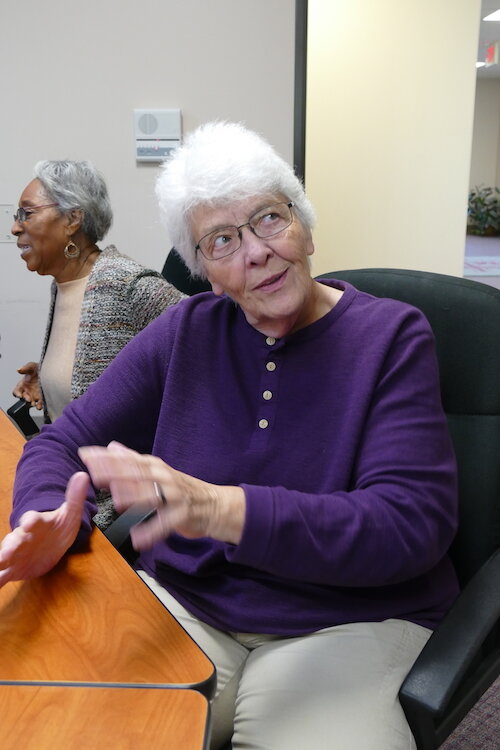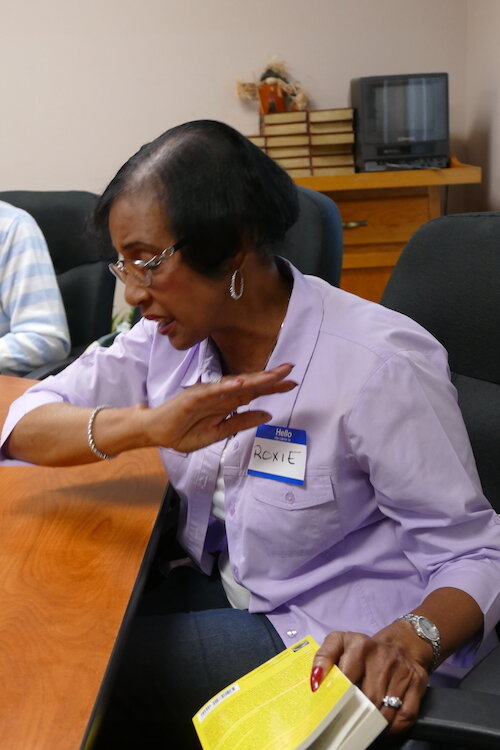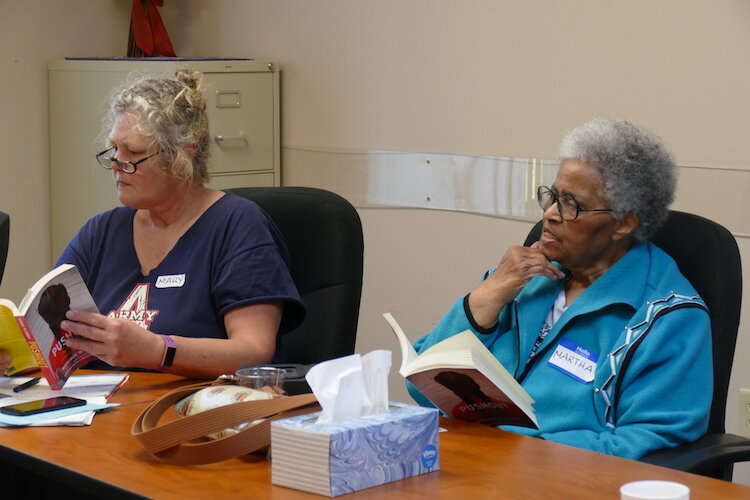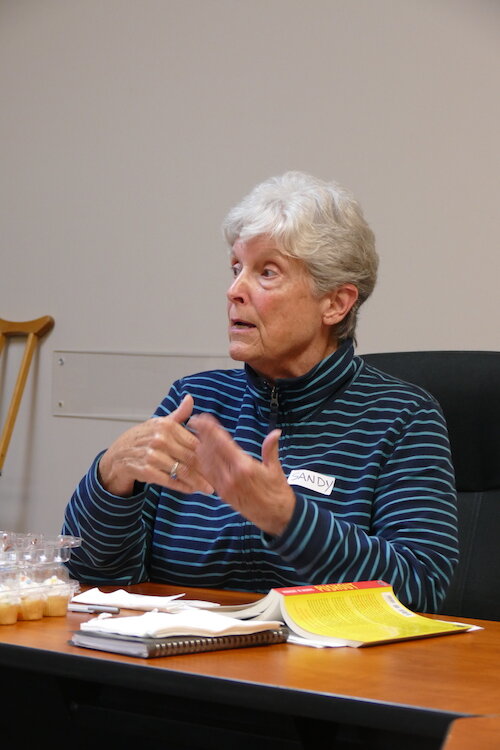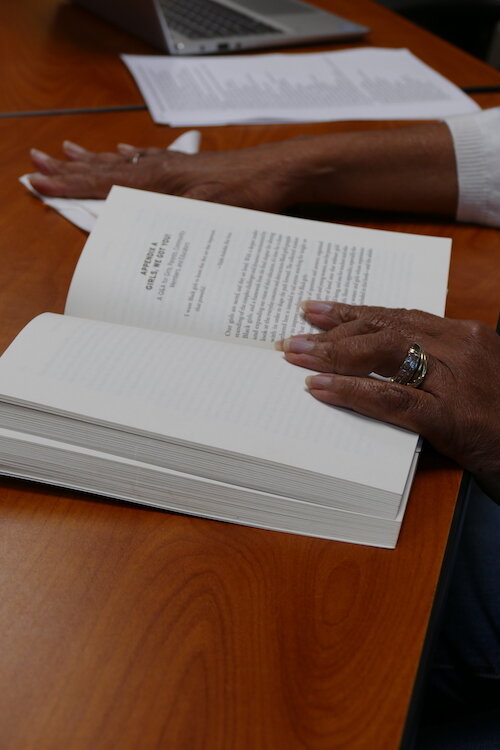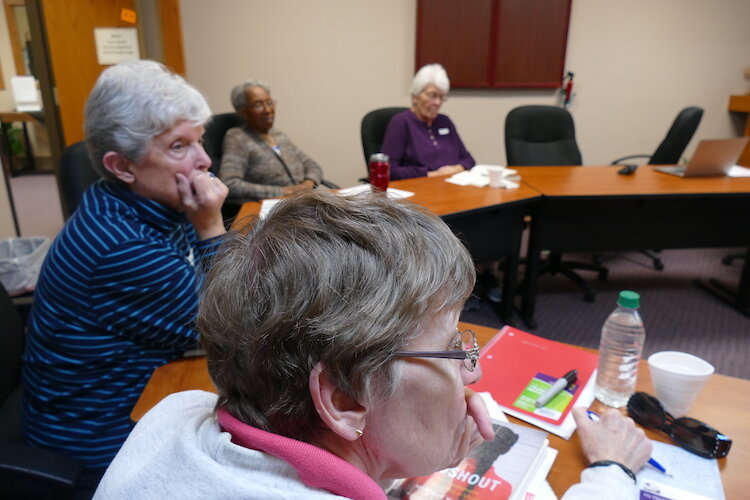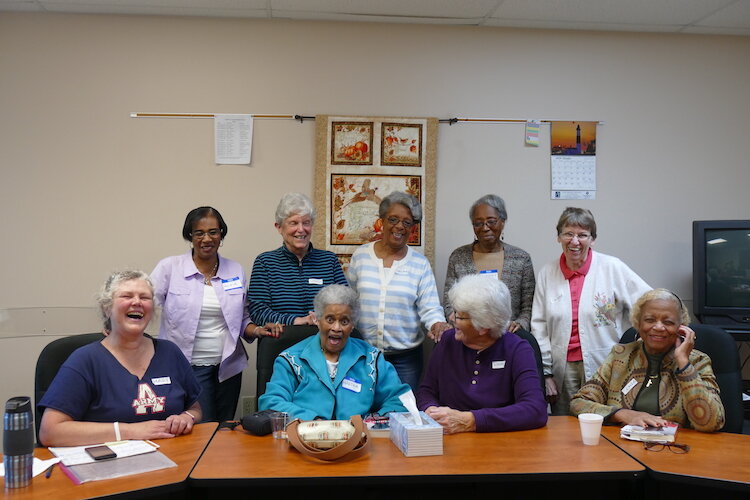Sacred Conversations: This Battle Creek book group tackles race and healing through words and action
More than a book group, these Battle Creek readers explore the inherent value in all human beings and the importance of talking to one another.
Editor’s note: This story is part of Southwest Michigan Second Wave’s On the Ground Battle Creek series.
The good, the bad, the ugly, and the indifferent are laid bare every Monday by a group of 15 women and men who come together at a Battle Creek church to read and have the difficult conversations about race and healing.
They call themselves the “Sacred Conversations Group”, and while their meetings begin and end with a prayer, the word “sacred” as it pertains to them also refers to the fostering of a safe and respectful space where they are able to have open and honest discussions about issues of race while seeking common ground.
“If someone in our group says something that offends me, I can trust that it was not intentionally said to hurt me and I don’t have to be afraid,” says Debbie Miller, a retired Kellogg Community College instructor. She was paraphrasing a sentiment from another member.
That member is Sonja Lindsey, a retired nurse and “professional grandmother,” who says that after joining the group she learned words and ideas about racism that she as a black woman didn’t previously know. She says the conversations she has had within the group made her realize how prejudiced she was.
“I had a pre-set mindset about white people. Being in these conversations and hearing everybody’s stories has opened my heart and my understanding and showed me who I was,” Lindsey says. “We get to look inward and find that the things we’re accusing someone else of are the same things we’re doing.”
Books selected by the group provide the launching point into these conversations and while they think of themselves as book group and do plenty of reading and discussing, it often takes well over 30 minutes to start in on that week’s book discussion because they’re catching up with each other’s personal experiences and stories; expressing opinions about happenings on the local, national, and world stage; and discussing requests for support from other groups.
This support includes a food pantry that didn’t have paper products as one of the members discovered while dropping off items. After the group learned about this, they “flooded” three food pantries with donations of paper products. They’ve also donated socks and gloves to different community organizations; rolled bandages for use by church missionaries in the Democratic Republic of Congo; provided financial support to the Equal Justice Initiative in Alabama and funded local women who teach female immigrant detainees housed at the Calhoun County Jail.
“We’re not just coming together to read books,” says Martha Brown, a retired Federal Center employee. “We see a need and we rise to the occasion.”
In August, they rose to the occasion to honor the lives of those lost in shootings in El Paso, Texas, and Dayton, Ohio, by holding high big red hearts on the I-94 overpass on Capital Avenue. Every January for the past three years they have been displaying those same hearts to coincide with the W.K. Kellogg Foundation’s Truth, Racial Healing & Transformation initiative and Martin Luther King, Jr. celebrations and observances. When they engage as a group in these social justice efforts, they call themselves the “Street Hearts.”
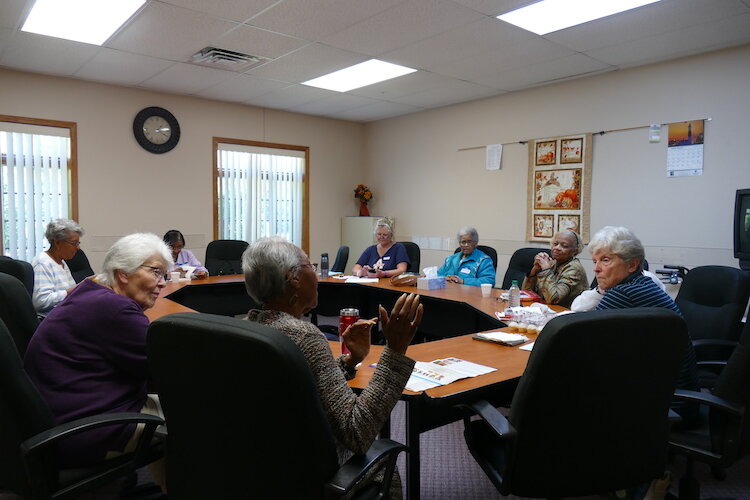
This action is a direct result of the awareness that increases for each one of them with every book they read and every weekly conversation that they have in a meeting room at the Second Missionary Baptist Church. That church and the First Congregational were among four churches – two with a predominantly black congregation and two with a majority white congregation – who had 10 members each that came together in 2009 to meet monthly to hold “Sacred Conversations on Race.”
These gatherings came about at the request of the United Church of Christ which was seeking a way to address negative political accusations against then-presidential candidate Barack Obama because of his affiliation with a UCC church in Chicago. At the time the Chicago church was led by Jeremiah Wright, who was in the news for making racially charged remarks.
When the fourth and final session with the church groups happened in May 2009, one of the groups decided they wanted to continue meeting and the “Sacred Conversations” group came together. They picked “The Shack” by William Young as their first read and are now up to their 68th book titled “Pushout – The Criminalization of Black Girls in Schools.” It highlights the experiences of these girls and shows how stereotypes and stigma make black female students vulnerable to misunderstandings and mistreatment.
There is no time limit on when the selected book needs to be finished and there also are no rules, guidelines or leaders of the group, something that really surprised Lindsey when she first joined. Unlike many book groups that establish a set date to finish reading a book, Sacred Conversation members take their time because they never know how long a discussion will take or where it may lead them.
“We’re like a spiritual group that’s just able to flow and if you aren’t able to be here, it’s OK,” she says.
“We may start off reading Chapter Three and have experiences that parallel what is being experienced in the book,” says Dorothy McClendon, a retired social worker. “Sharing some values and preconceived notions brings us to a point where we have a greater understanding of ourselves and can understand the good, the bad and the ugly, but have an impact that will cause them to change.”
Membership in the group grew through friend asking friend, or in Leonard Harris’ case, making a point of being included. Harris, who retired from a job in finance with the Kellogg Co., says he made sure Roxie Perry, a member of Sacred Conversations, was aware of his interest in joining when members of the group made a request of his church.
“You all had the book with you. It was ‘The Warmth of Other Suns’ and I told her I read the book and she finally decided to ask me to come to the group,” Harris recounts to his fellow members.
Years after he joined Sacred Conversations, Harris invited Mary Bourgeois to a meeting after they discovered they were both reading the same book, “White Fragility.” The two met at a community event.
Bourgeois chokes back tears as she talks about how the group has transformed her thinking on issues of race.
“I was in the Army for 13 years and didn’t realize what a racist I was until I started doing some deep diving,” she says. “I didn’t realize how much white privilege I had. So many other people have had to pay a price for my white privilege. That was something I wasn’t even aware of until recently.”
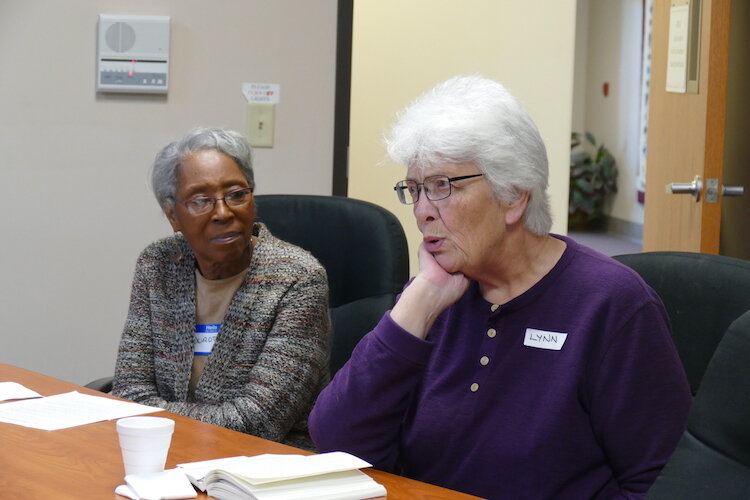
But, not everyone who has attended a Sacred Conversations gathering has stayed. Sandy Wehling, a member who is retired from the Calhoun Area Technology Center, says the optimum number is 15 so they can maintain an open and honest dialog in the safe space that has been created.
Although there was never a formal vetting process or votes taken on who was “in” or “out”, the willingness to put in the hard work to have the difficult conversations is what weeds people out, McClendon says.
“It’s really hard work and it’s a hard thing for people to talk openly and honestly about racial issues,” she says. “There’s no way for people to read a book and discuss it and not bring their own ideas and some people couldn’t do that.”
The beauty of the group, she says, is that “We’ve been together for awhile and we’ve developed a high level of trust. We’re all willing to share and be completely honest with each other.”
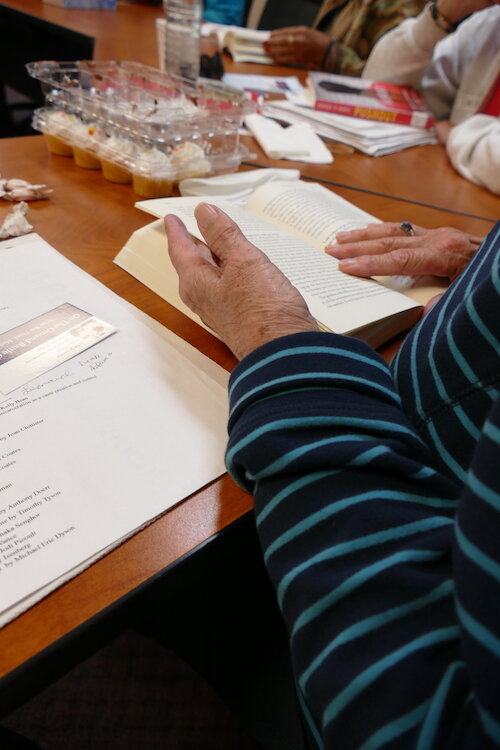
Wehling says the relationship “piece” of the group is very important to her. “Loving and authentic relationships are developed here,” Wehling says. “In an authentic relationship it’s really about each person in that relationship telling their story and having their story and history heard. Even when we discuss a book that isn’t about race, as we’re hearing other peoples’ perspectives through discussions we have learned peoples stories and histories. That is what makes our group so tight and close.”
Acknowledging the truth is hard work, McClendon says.
“For me to say to a white person that you have what you have because of the color of your skin, you were able to inherit what you have, and as black people in slavery we had zip, and the person I’m speaking with does not see it as the truth, but rather as an indictment of who they are,” she says, is hard for many people. “I’m sure no one in this room has owned a slave and I have never been a slave, but the whole slavery thing is just who I am.”
While members of Sacred Conversations have reached a point where they can share their thoughts freely, McClendon says this is not happening often enough outside of their meeting room.
Brown says group members speak so frankly with each other that they sometimes forget that in the outside world, “it’s not OK,” and is not received with the same level of acceptance.
“We have black people in this group who have never talked about racism with white friends,” McClendon says.
The group’s members say they’re not out to change the world and are focusing instead on working with one person and one relationship at a time.
Harris says he thinks that through discussions like those happening with Sacred Conversations and within other organizations and churches people do begin to see the inherent value in all human beings and the importance of talking to one another.
“I see the awareness developing over time. It is a slow process for a lot of people,” he says.

